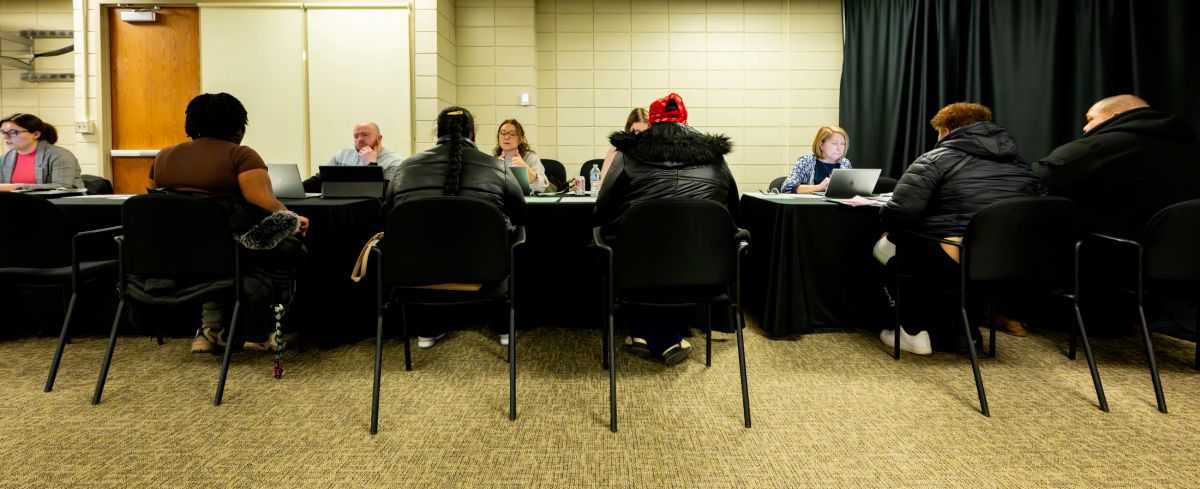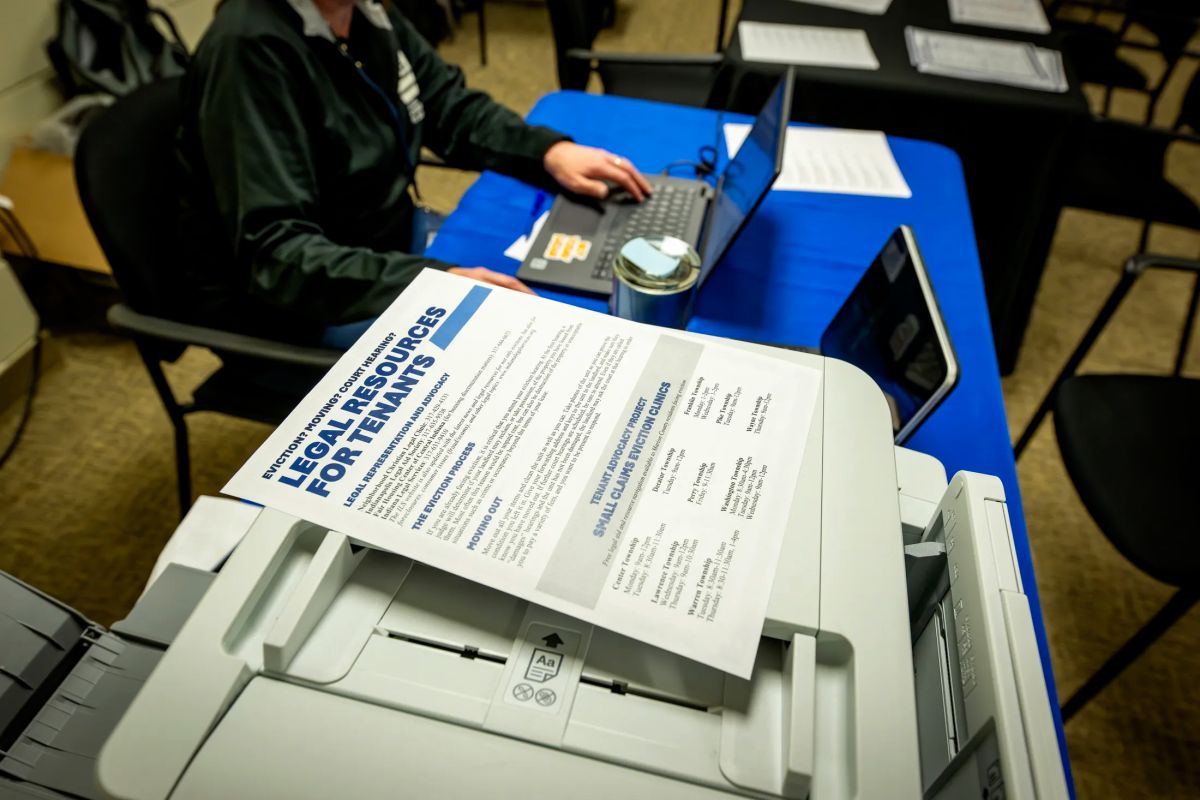
Wayne Township court navigator Laurin Embry (right) helps Korarita Wallace with the process of having her past eviction cases sealed Jan. 17, 2025, in Lawrence, Ind. Volunteer attorneys, paralegals and housing advocates assisted people looking to have their past eviction cases sealed Jan. 17, 2025, in Lawrence, Ind.
Doug McSchooler for Mirror IndyHousing advocates saw promise in a bill that would make it easier for renters to get some evictions sealed from their record.
But they aren’t nearly as excited now after legislators in the Indiana Senate made a key change to the Republican-authored bill. Some worry the legislation wouldn’t make much of a difference at all.
When it was first introduced, Senate Bill 142 would have required courts to automatically seal an eviction from a tenant’s record as long as the tenant met the conditions outlined in law. The bill also originally would have automatically sealed all cases after seven years, although a Senate committee removed that language.
Housing advocates and attorneys considered automatic sealing to be a rare win for renters in a landlord-friendly state.
By the time the full Senate approved the bill, though, lawmakers shifted the burden back to the renter to file paperwork with their local court — which is the way it already works.
“That bill being watered down will do absolutely nothing,” said Laurin Embry, a court navigator who helps people facing eviction in Wayne Township.

Housing advocates say eviction sealing is critical because landlords won’t see the cases if they search court records when screening potential tenants.
Not every eviction can be sealed, though. To qualify, there can’t be an existing judgment that says the renter owes the landlord money in the case. The eviction also must have been dismissed by the court, decided in the renter’s favor, or overturned or vacated on appeal.
And in a city where landlords filed around 2,000 evictions per month last year, the cases can pile up.
Some renters, unsure of where to even start, need help navigating the eviction sealing process under the current rules.
Eviction sealing clinics are in high demand
Korarita Wallace traveled 35 minutes across town on a recent Friday to Lawrence, where the nonprofit Indiana Legal Services hosted an eviction sealing clinic.
There, attorneys helped people find their past evictions and determine if they might be eligible to be sealed.
The attorney who helped Wallace found seven eviction cases. It appeared five were eligible, since she either never owed money in the case or had paid it off.

Wallace, 45, said she was thankful for the attorneys who helped her for free — along with other workers who filed the motions to seal electronically.
But that took more than two hours. Wallace had to take time off of work just to be there.
As it was originally written, Senate Bill 142 wouldn’t have made this eviction sealing clinic completely unnecessary. For one thing, evictions filed before 2021 had a case number that didn’t distinguish them from any other small claims cases — a quirk that made it difficult to track evictions. Attorneys say it would be more difficult to automatically seal those cases.
But standing outside a large room where dozens of other people were waiting for the same assistance she got, Wallace said an automatic sealing process would make life easier by cutting out extra steps to get something they already qualify for.
“It would be a lot better,” she said.
Why the change?
The crucial change to the bill came from Sen. Aaron Freeman, R-Indianapolis. His amendment removed the requirement that courts automatically seal eligible evictions.
Part of the reason, he said during a Senate session, was that he didn’t want to overburden courts.
But he also said he wants people who have an eviction on their record to face accountability.
“I believe there’s personal responsibility,” Freeman told Mirror Indy, “and people should be responsible for their actions.”

But if any lawmakers disagreed with Freeman, it wasn’t enough to change their vote. The bill passed out of the Senate by a vote of 49-0. The bill was authored by Sen. Liz Brown, R-Fort Wayne. Sen. Greg Taylor, D-Indianapolis, is a co-author.
The problem, according to attorneys who work with people to get their evictions sealed, is that a lot of times those who’ve been evicted don’t know enough about the process — including where to find their case, how to know if it’s eligible to be sealed and how to file the right paperwork with the court.
And in many cases, renters and landlords settle outside of court, with the tenant agreeing to move out by a certain date or start on a payment plan.
Even if the landlord dismisses the case, it still exists as an eviction filing on the tenant’s record until they file the paperwork to get it sealed.
“Sometimes people aren’t even aware that they’re being impacted by this,” Jenny Terry, an attorney with Indiana Legal Services, said at the Lawrence eviction sealing clinic.

Adam Mueller, executive director of Indiana Justice Project, said he runs into similar issues when helping people seal their evictions. Mueller pulls up the court records, starts going through cases.
“Then,” he said, “they’ll find an eviction on their record that they didn’t even know about.”
But Senate Bill 142 could still have a positive impact, Mueller said, by clarifying that a renter who pays off their money judgment is eligible to have the case sealed. As it stands now, renters who pay off their judgment need to take the extra step of also getting their eviction case dismissed in court.
The change would line up with a recent report from the Indiana Justice Project and the Notre Dame Clinical Law Center, which recommended simplifying the sealing process for renters who pay off their money judgment.
“That to us is a very good thing,” Mueller said.
What’s next?
The bill will next head to the House for consideration.
Rep. Alex Zimmerman, R-North Vernon, is carrying the bill in the House. Rep. Cherrish Pryor, D-Indianapolis, is a cosponsor.
If the House amends the bill before approving it, the bill will go to a conference committee, where representatives and senators work together to create a version of the bill that works for both chambers.
 DONATE
DONATE






 Support WFYI. We can't do it without you.
Support WFYI. We can't do it without you.